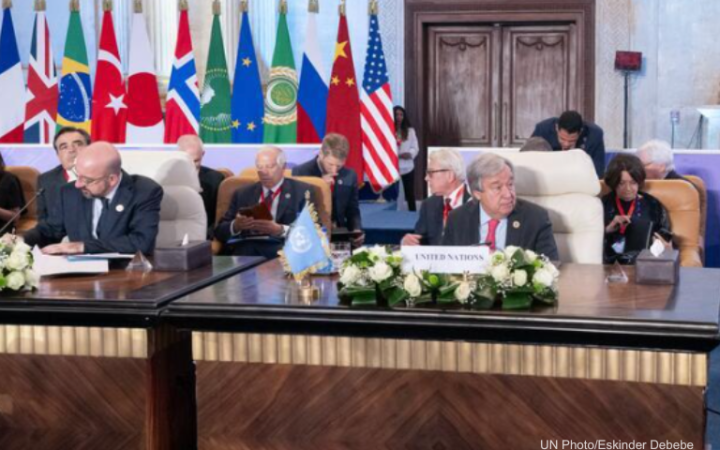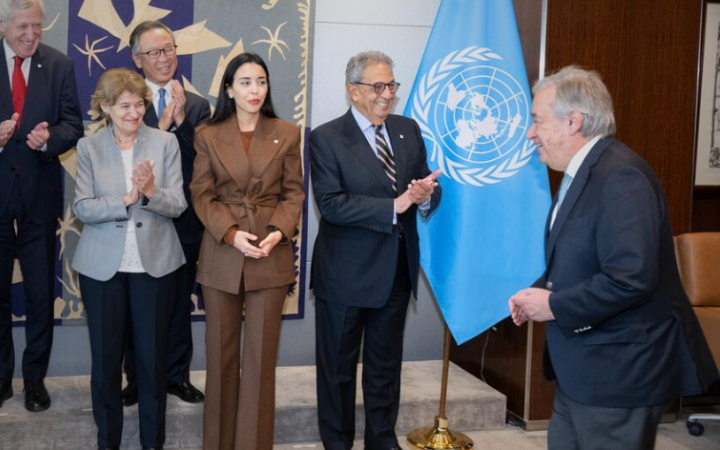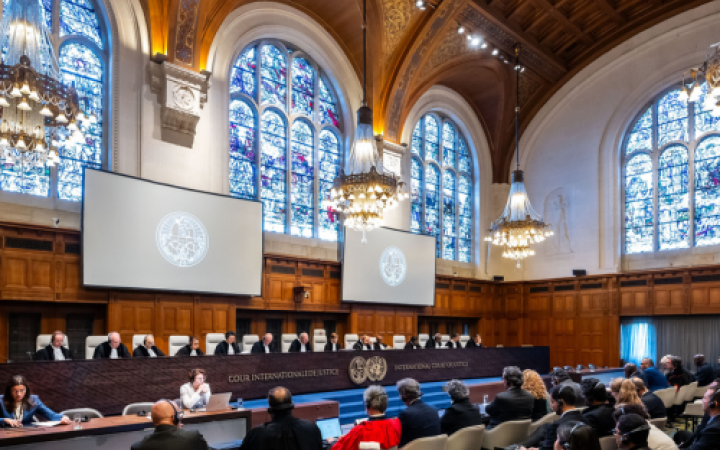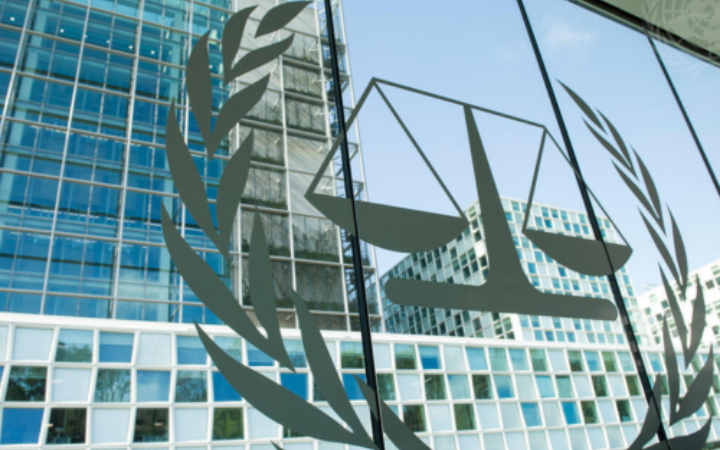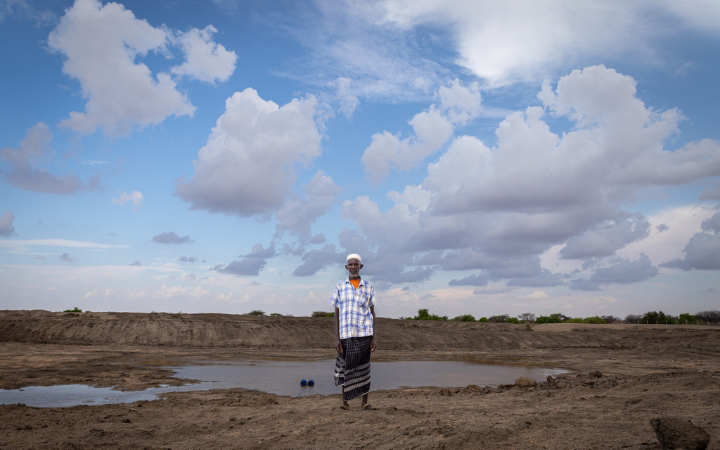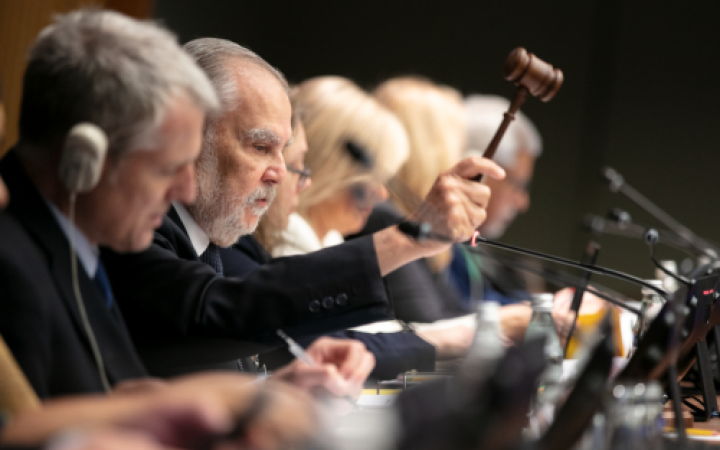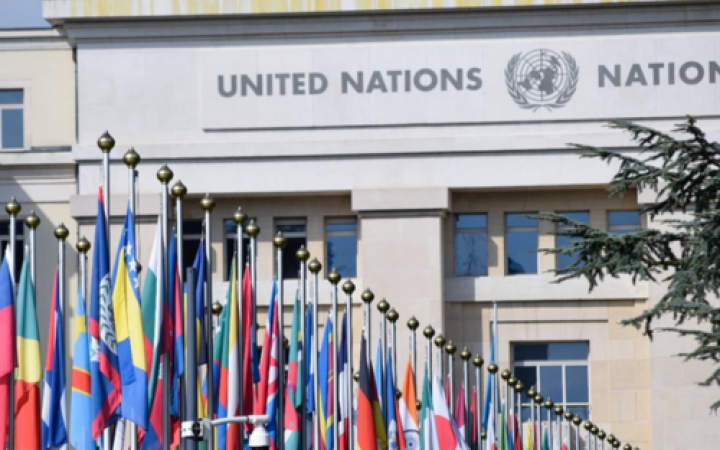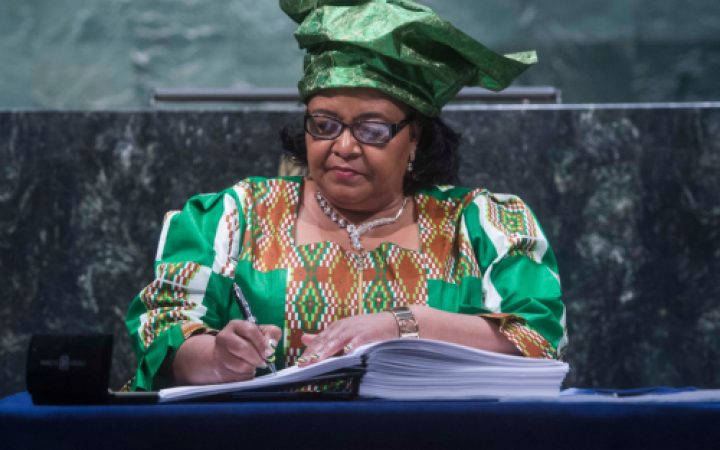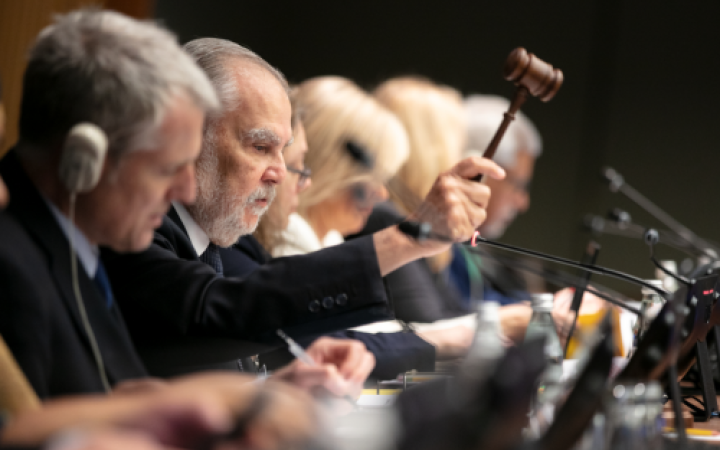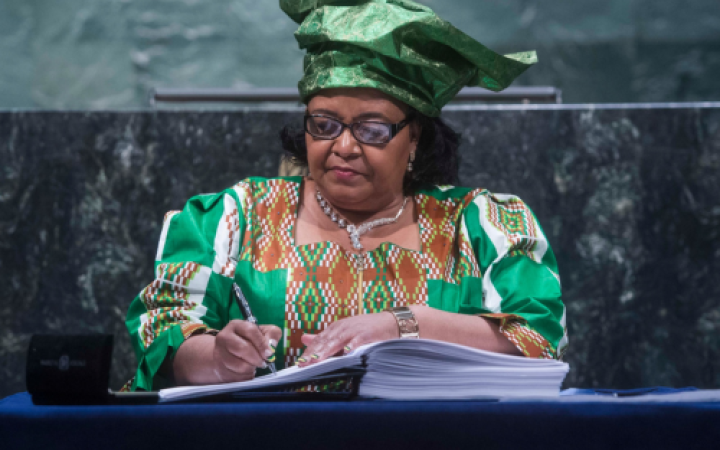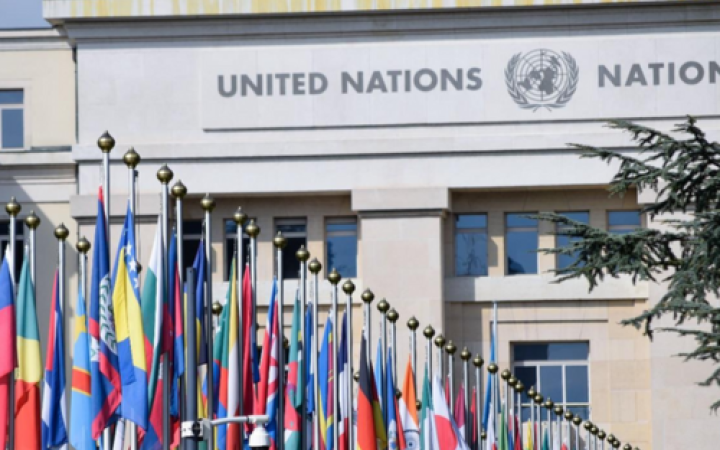The International Law Programme works to enhance the capacities of diplomats, public officials, delegates, professionals, students, and other stakeholders on various topics related to international law. The programme offers a wide range of training activities, including master programmes offered jointly with other institutions, high-level executive diplomas, tutor-facilitated online courses, self-paced online courses, face-to-face training activities, and the blended Intensive Training Programme on International Law. Furthermore, the International Law Programme cooperates with partner organizations to create tailor-made learning products for a specific target audience. Kindly find below UNITAR's programmes in International Law and Legal Skills, amongst the following offerings:
M.A. in International Law and Diplomacy in cooperation with the University for Peace (UPEACE)
UNITAR and the University for Peace (UPEACE) offer a joint Master of Arts in International Law and Diplomacy. This two-year graduate programme, offered in online and hybrid formats, allows students to specialize in the interface between international law and diplomacy. It will not only broaden student’s knowledge in the field of international law and its various foundational dimensions but will also equip them with knowledge and skills to work in the field of diplomacy and related international careers.
M.A. in International Law and the Settlement of Disputes in cooperation with the University for Peace (UPEACE)
UNITAR and the University for Peace (UPEACE) offer a joint Master of Arts in International Law and the Settlement of Disputes. This two-year graduate programme, offered in in-person, online and hybrid formats, allows students to specialize in the interface between international law and diplomacy. This specialization examines the role of national and international courts and tribunals in contributing to the settlement of disputes. As international and transnational adjudication has acquired a more prominent role in international relations, it is essential to understand how these global and regional courts are responding to the challenges of the early 21st Century. Students will examine the role of international law in the settlement of disputes in a wide array of fields such as human rights, armed conflicts, territorial and maritime border issues, environment and climate change, multilateral trade, investments, amongst others. Students will learn not only the traditional legal processes employed in international and transnational adjudication but also the alternative forms of dispute settlement prevalent in international law. Students will also attend skills development sessions that are designed to support their professional career and employability.
Certificate in International Law and Diplomacy (UPEACE-UNITAR)
The Certificate in International Law and Diplomacy is a programme permitting students to specialize in the interface between international law and diplomacy. It will not only broaden students’ knowledge in the field of international law and its various foundational dimensions but will also equip them with knowledge and skills to work in the field of diplomacy and related international careers. During this programme, students will analyse the different dimensions of international law including those related to law-making, armed conflicts, human rights, economic relations, as well as those related to the theory and practice of diplomacy in the 21st century including dispute settlement and conflict resolution.
Certificate in International Law and the Settlement of Disputes (UPEACE-UNITAR)
The Online Certificate in International Law and the Settlement of Disputes offers participants an understanding of the role that international law and institutions play in the settlement of international and transnational disputes. This specialization examines the role of national and international courts and tribunals in contributing to the settlement of disputes. As international and transnational adjudication has acquired a more prominent role in international relations, it is essential to understand how these global and regional courts are responding to the challenges of the early 21st Century.
Online Diploma on the Fundamentals of International Law
The Online Diploma on the Fundamentals of International Law System offers a unique opportunity for both students wanting to pursue a career in international law or international relations, and professionals working in international and regional organizations as well as governmental and non-governmental institutions, to expand their knowledge on the key aspects of international law.
Using internet-based training, UNITAR brings participants and trainers together in a unique virtual learning environment, allowing students follow the three webinar tracks of the Law core courses: International Law, Law of Treaties and Law of International Organisations.
Next Dates:
- 2026 Spring Edition: 2 March – 14 June 2026, Deadline 22 February 2026. Register here
- 2026 Fall Edition: 31 August – 22 November 2026, Deadline 23 August 2026. Register here
Fees: Full paying: $1000 , Developing country fee reduction $800, LDC and SIDS fee reduction: $600.
Executive Diploma on International Law in the 21st Century
International law is pushing frontiers both on earth, outer space and in the digital realm. Explore these cutting-edge legal topics together with high-level international experts. Following the successful previous editions, the fall intake of UNITAR’s Online Executive Diploma on International Law in the 21st century aims at introducing students and practitioners to newest developments in international law, covering diverse issues such as Law of the Sea, Cyber Warfare and International Humanitarian Law.
Next Dates: TBC
Fees: $1490
Executive Diploma on International Criminal Law and Transitional Justice
Under UN leadership, the last 30 years have seen remarkable development in the fight against impunity. Many different accountability mechanisms – truth commissions, international and hybrid tribunals, as well as commissions of inquiry, fact-finding missions and investigations – have been established and successfully implemented. This Executive Diploma on International Criminal Law and Transitional Justice will provide participants with unique access to information, perspectives, updates and analysis on accountability mechanisms for both those seeking to develop a working background on the topics as well as those already thoroughly versed in their dynamics. Combining substantive sessions on topics such as the notion of mass human rights violations, as well as the history, development and achievements of different accountability mechanisms, with skills-focused modules, this training will provide participants with a wholistic training experience and allow them to put their substantive knowledge into practice. This Executive Diploma is delivered in partnership with the IUSTICOM.
Next Dates: TBC 2026
Fees: $2850, Developing country fee reduction $1700, LDC and SIDS fee reduction: $1500.
Human Rights, Environmental Protection, And Climate Change
This tutor-facilitated course introduces participants to the application of human rights to environmental issues and the procedural and substantive obligations relating to the environment, covering Principle 10 of the Rio Declaration, as well as the obligations relating to vulnerable groups. Through examples of constitutions that have incorporated a right to a healthy environment, good practices in procedural and substantive environmental protection, as well as good practices in the protection of groups particularly vulnerable to environmental harm, participants will understand how the relationship between human rights and environmental protection takes place in practice.
Next Dates: TBC
Fees: Full paying: $500, Developing country fee reduction $400, LDC and SIDS fee reduction: $300.
TBC 2026
International Humanitarian Law
War remains a matter of great concern to humanity. Recent conflicts have demonstrated that the ravages of war continue to have a devastating impact especially on the civilian population.
War might be the “end of the law” as one said, but International Law is not silent on armed conflicts. From its conception in 1859 on the battlefield of Solferino to contemporary warfare, modern International Humanitarian Law (IHL) has been confronted with significant challenges. Since the times of horses and bayonets to drones and other ‘Lethal Autonomous Weapons System’ (the so-called “killer robots”), the IHL has always had the purpose of regulating the means and methods of warfare in order to limit human suffering. The development and sophistication of weapons has made it paradoxically problematic to distinguish between civilians and combatants in order to better protect the former. In addition, the proliferation of non-international armed conflicts (civil wars) and the emergence of new forms of armed conflicts, i.e. the “war on terrorism”, pose new challenges to the protection of civilian persons and goods.
Next Dates:
- 2026 Spring Edition: TBC.
- 2026 Fall Edition: TBC.
Fees: $650, Developing country fee reduction $550, LDC and SIDS fee reduction: $500.
International Law - Webinar Track
The subject of international law brings a lot of concepts to mind, from war and settlement of disputes between States, protection of the environment, responsibilities and obligations, to human rights protection between citizens, refugees of different States and corporations. Globalization has forced us to interact with each other, making it essential to have common rules to guide and sustain relationships (of trade, investment, technology, etc.) between individuals and States from different regions and continents. Now, many of domestic laws are highly influenced and molded by the rules of international law. International law provides mandatory principles, norms and rules that regulate the relations between States as well as with other non-State actors, like international organizations and individuals.
This webinar edition of UNITAR's traditional online course offers participants the chance to ask questions to a high level expert during a Q&A webinar.
Next Dates:
- 2026 Spring Edition: 2 – 22 March 2026: Webinar on Friday 20 March, 10:00 – 12:00. Deadline 1 March 2026. Register here
- 2026 Fall Edition: 31 August – 20 September 2026: Webinar on Friday 18 September, 10:00 – 12:00 (TBC). Deadline 30 August 2026. Register here
Fees: $400
Law of International Organizations - Webinar Track
International organizations are playing an increasingly important role in the international legal order. They are active in virtually all fields of human activity, they regularly conclude international treaties and continuously interact with other actors of international law. Nowadays, they wield growing normative powers. For those working for or dealing with international organizations, a sound understanding of the law of international organizations thus appears indispensable. UNITAR’s self-paced course on the Law of International Organizations is structured in a way to cover the main legal questions related to international organizations, from both a theoretical and practical perspective. In addition, the e-learning methodology used to deliver the Course allows participants the flexibility to combine their learning activities with work responsibilities and to benefit from high-quality training.
This webinar edition of UNITAR's traditional online course offers participants the chance to ask questions to a high level expert during a Q&A webinar
Next Dates:
- 2026 Spring Edition: 20 April – 10 May 2026: Webinar on Friday 8 May, 10:00 – 12:00 (TBC), Deadline 12 April 2026. Register here
- 2026 Fall Edition: 28 September – 18 October 2026: Webinar on Friday 16 October, 10:00 – 12:00 (TBC), Deadline 20 September 2026. Register here
Fees: $400
Law of Treaties - Webinar Track
The International Law of Treaties is a set of international principles and rules regulating the conclusion procedure of treaties, as well as the issues of operation, amendments and modifications, termination, suspension and invalidity of treaties. For those involved in the drafting, negotiation and conclusion of international treaties, a sound knowledge of the Law of Treaties is indispensable. Efficient implementation and application of international legal norms is impossible without knowing the essentials of the International Law of Treaties. UNITAR’s course on the Law of Treaties is designed to cover both the theoretical and the practical aspects of this subject, starting with the basic notions, sources, subjects, principles, and scope of application of conventions forming the base of the Law of Treaties.
This webinar edition of UNITAR's traditional online course offers participants the chance to ask questions to a high level expert during a Q&A webinar.
Next Dates:
- 2026 Spring Edition: 25 May – 14 June 2026: Webinar Friday 12 June, 10:00 – 12:00, Deadline 17 May 2026. Register here
- 2026 Fall Edition: 02 – 22 November 2026: Webinar Friday 20 November, 10:00 – 12:00 (TBC), Deadline: 25 October 2026. Register here
Fees: $400
International Law - Self Paced Track
The subject of international law brings a lot of concepts to mind, from war and settlement of disputes between States, protection of the environment, responsibilities and obligations, to human rights protection between citizens, refugees of different States and corporations. Globalization has forced us to interact with each other, making it essential to have common rules to guide and sustain relationships (of trade, investment, technology, etc.) between individuals and States from different regions and continents. Now, many of domestic laws are highly influenced and molded by the rules of international law. International law provides mandatory principles, norms and rules that regulate the relations between States as well as with other non-State actors, like international organizations and individuals. is self-paced course aims to provide participants with a comprehensive knowledge of the fundamentals of International Law that is necessary to understand the importance, role and purpose of international law in the contemporary legal order and international community.
Next Dates:
- Q1: 5 Jan - 5 April 2026, Deadline 4 Jan 2026. Register here
- Q2: 6 April - 5 July 2026, Deadline 5 April 2026. Register here
- Q3: 6 July - 4 Oct 2026, Deadline 5 July 2026. Register here
- Q4: 5 Oct - 3 Jan 2027, Deadline 4 October 2026. Register here
Fees: $200
Law of the Treaties - Self Paced Track
The International Law of Treaties is a set of international principles and rules regulating the conclusion procedure of treaties, as well as the issues of operation, amendments and modifications, termination, suspension and invalidity of treaties. For those involved in the drafting, negotiation and conclusion of international treaties, a sound knowledge of the Law of Treaties is indispensable. Efficient implementation and application of international legal norms is impossible without knowing the essentials of the International Law of Treaties. UNITAR’s course on the Law of Treaties is designed to cover both the theoretical and the practical aspects of this subject, starting with the basic notions, sources, subjects, principles, and scope of application of conventions forming the base of the Law of Treaties.
Next Dates:
- Q1: 5 Jan - 5 April 2026, Deadline 4 Jan 2026. Register here
- Q2: 6 April - 5 July 2026, Deadline 5 April 2026. Register here
- Q3: 6 July - 4 Oct 2026, Deadline 5 July 2026. Register here
- Q4: 5 Oct - 3 Jan 2027, Deadline 4 October 2026. Register here
Fees: $200
Law of International Organisations - Self Paced Track
International organizations are playing an increasingly important role in the international legal order. They are active in virtually all fields of human activity, they regularly conclude international treaties and continuously interact with other actors of international law. Nowadays, they wield growing normative powers. For those working for or dealing with international organizations, a sound understanding of the law of international organizations thus appears indispensable. UNITAR’s self-paced course on the Law of International Organizations is structured in a way to cover the main legal questions related to international organizations, from both a theoretical and practical perspective. In addition, the e-learning methodology used to deliver the Course allows participants the flexibility to combine their learning activities with work responsibilities and to benefit from high-quality training.
Next Dates:
- Q1: 5 Jan - 5 April 2026. Deadline 4 Jan 2026. Register here
- Q2: 6 April - 5 July 2026. Deadline 5 April 2026. Register here
- Q3: 6 July - 4 Oct 2026. Deadline 5 July 2026. Register here
- Q4: 5 Oct - 3 Jan 2027. Deadline 5 October. Register here
Fees: $200
International Environmental Law - Self Paced Track
Multilateral Environmental Agreements (MEAs) are the predominant legal method for addressing transboundary environmental problems. Adopted by States, MEAs are standard-settings instruments for effective global environmental protection. However, nowadays some States, particularly least developed and developing countries, face the challenge of implementing over 300 MEAs due to limited technical, financial and human resources. This course will provide you with the basics of International Environmental Law (IEL) by identifying its sources and fundamental principles, the law-making process, its main actors, as well as the implementation and compliance procedures needed to understand and apply Multilateral Environmental Agreements.
Next Dates:
- Q1: 5 Jan - 5 April 2026, Deadline 4 Jan 2026. Register here
- Q2: 6 April - 5 July 2026, Deadline 5 April 2026. Register here
- Q3: 6 July - 4 Oct 2026, Deadline 5 July 2026. Register here
- Q4: 5 Oct - 3 Jan 2027, Deadline 4 October 2026. Register here
Fees: $200
Techniques and Procedures of International Environmental Law - Self Paced Track
For the adequate implementation of and compliance with MEAs at a national level, there is a need to raise awareness on International Environmental Law (IEL) and develop specific capacities for its implementation at the national level. This course explores the the technical and procedural aspects of the different mechanisms made available in international environmental law to facilitate the creation and implementation of sound environmental norms; from the regulatory and economic instruments used by policy-makers, to the role of Environmental Impact Assessments and public participation in environmental decisions.
Next Dates:
- Q1: 5 Jan - 5 April 2026, Deadline 4 Jan 2026. Register here
- Q2: 6 April - 5 July2026, Deadline 5 April 2026. Register here
- Q3: 6 July - 4 Oct 2026, Deadline 5 July 2026. Register here
- Q4: 5 Oct - 3 Jan 2027, Deadline 4 October 2026. Register here
Fees: $200


